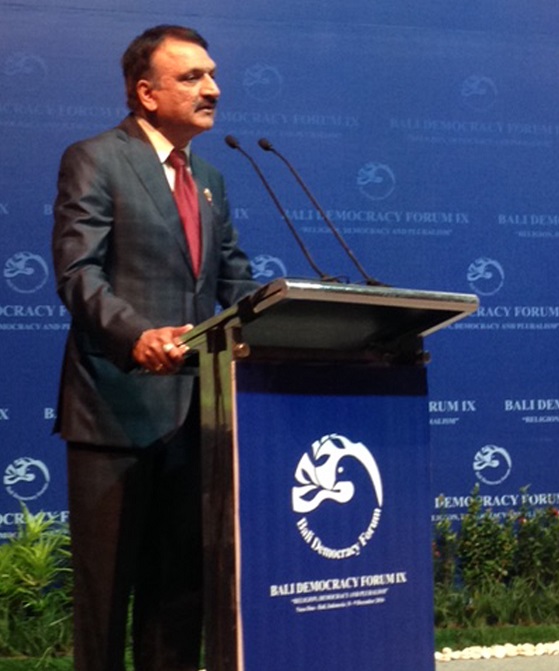Nepal for mainstreaming Right to Development
 Kathmandu / Feb 28: Foreign Minister Dr Prakash Sharan Mahat has stressed that the right to development should be mainstreamed and be treated on equal footing as civil, political, social, economic and cultural rights. “For many developing countries like Nepal, the right to development bears a profound meaning,” he said.
Kathmandu / Feb 28: Foreign Minister Dr Prakash Sharan Mahat has stressed that the right to development should be mainstreamed and be treated on equal footing as civil, political, social, economic and cultural rights. “For many developing countries like Nepal, the right to development bears a profound meaning,” he said.
In a statement at the High-level Segment of the 34th Session of the Human Rights Council in Geneva on Tuesday evening, Dr Mahat said greater flows of ODA, FDI, technology transfer, improvement of connectivity and market access for goods and services could help achieve the development aspirations of less developed countries.
Stating that Nepal stands for an earliest conclusion of the protracted negotiation on an agreement on the right to development, Dr Mahat said realization of this right should be an integral part of the implementation of the SDGs and other internationally agreed development goals. “While inclusive development is not possible in the absence of human rights, we must also recognise that socio-economic development contributes for sustaining and institutionalizing the human rights gains,” he added.
The Foreign Minister said human rights forms a fundamental pillar of the Constitution of Nepal promulgated in September 2015, consolidating inclusive democratic polity, pluralism, the rule of law, representative and accountable government, social and economic justice, and universally accepted human rights.
Cognizant of the ethnic, geographic and linguistic diversity of the country, the Government wants to accommodate legitimate aspirations of all segments of our society, he said while adding that it is in this spirit that the Government is currently engaged in a dialogue with concerned stakeholders to address some of the issues where differences persist.
The Government is fully committed to providing all support to the effective functioning of the two Commissions set up to address the issues of transitional justice as well as to streamline the statutory issues to make them fully compliant with international standards. “We are also committed to addressing the needs of the victims, including reparations and compensations, and create an atmosphere of reconciliation in society as per the spirit of Comprehensive Peace Agreement signed in 2006,” he said.
Sharing Nepal’s constitutional guarantee of ensuring equitable and proportional representation in the elected State structures including political representation of 33 per cent women at the central and provincial levels and 40 per cent at the local level, Dr Mahat also noted that it was hardly a coincidence that the President, the Chief Justice, and the Speaker of the Parliament in Nepal at present are women.
Nepal’s first candidature in the UNHRC
In course of his address, Foreign Minister Dr Mahat also solicited support from all members and observer states to Nepal’s candidature in the Human Rights Council for the term 2018-2020. “Following successful democratic transition, we want to share the experience of our unique peace process to the world community and by being in the Council we also aspire to benefit from the international experiences for the consolidation of culture of human rights,”, he said.
Dr Mahat also noted that Nepal believes that fair opportunity of all interested States to serve in the UN Human Rights Council would contribute to the common goals of promotion and protection of human rights everywhere.
This is the first time that Nepal has presented its candidature to the Council. Nepal, Dr Mahat said, wants to play a role in advancing the ideals of human rights to make it a reality for peace, prosperity and wellbeing of people everywhere. RSS
